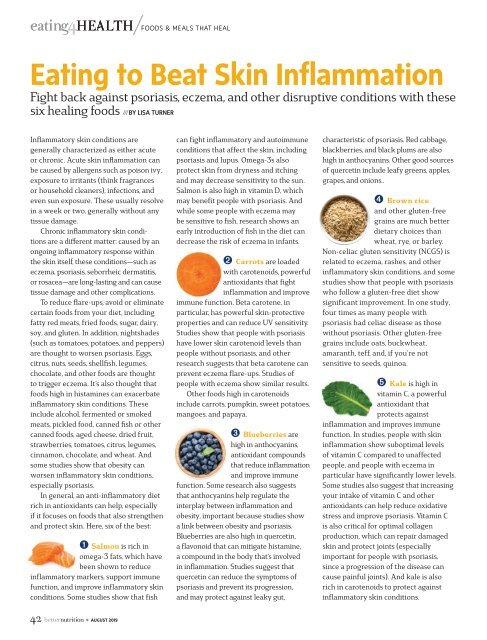You also want an ePaper? Increase the reach of your titles
YUMPU automatically turns print PDFs into web optimized ePapers that Google loves.
eating4HEALTH/FOODS & MEALS THAT HEAL<br />
Eating to Beat Skin Inflammation<br />
Fight back against psoriasis, eczema, and other disruptive conditions with these<br />
six healing foods /// BY LISA TURNER<br />
Inflammatory skin conditions are<br />
generally characterized as either acute<br />
or chronic. Acute skin inflammation can<br />
be caused by allergens such as poison ivy,<br />
exposure to irritants (think fragrances<br />
or household cleaners), infections, and<br />
even sun exposure. These usually resolve<br />
in a week or two, generally without any<br />
tissue damage.<br />
Chronic inflammatory skin conditions<br />
are a different matter: caused by an<br />
ongoing inflammatory response within<br />
the skin itself, these conditions—such as<br />
eczema, psoriasis, seborrheic dermatitis,<br />
or rosacea—are long-lasting and can cause<br />
tissue damage and other complications.<br />
To reduce flare-ups, avoid or eliminate<br />
certain foods from your diet, including<br />
fatty red meats, fried foods, sugar, dairy,<br />
soy, and gluten. In addition, nightshades<br />
(such as tomatoes, potatoes, and peppers)<br />
are thought to worsen psoriasis. Eggs,<br />
citrus, nuts, seeds, shellfish, legumes,<br />
chocolate, and other foods are thought<br />
to trigger eczema. It’s also thought that<br />
foods high in histamines can exacerbate<br />
inflammatory skin conditions. These<br />
include alcohol, fermented or smoked<br />
meats, pickled food, canned fish or other<br />
canned foods, aged cheese, dried fruit,<br />
strawberries, tomatoes, citrus, legumes,<br />
cinnamon, chocolate, and wheat. And<br />
some studies show that obesity can<br />
worsen inflammatory skin conditions,<br />
especially psoriasis.<br />
In general, an anti-inflammatory diet<br />
rich in antioxidants can help, especially<br />
if it focuses on foods that also strengthen<br />
and protect skin. Here, six of the best:<br />
Salmon is rich in<br />
omega-3 fats, which have<br />
been shown to reduce<br />
inflammatory markers, support immune<br />
function, and improve inflammatory skin<br />
conditions. Some studies show that fish<br />
can fight inflammatory and autoimmune<br />
conditions that affect the skin, including<br />
psoriasis and lupus. Omega-3s also<br />
protect skin from dryness and itching<br />
and may decrease sensitivity to the sun.<br />
Salmon is also high in vitamin D, which<br />
may benefit people with psoriasis. And<br />
while some people with eczema may<br />
be sensitive to fish, research shows an<br />
early introduction of fish in the diet can<br />
decrease the risk of eczema in infants.<br />
Carrots are loaded<br />
with carotenoids, powerful<br />
antioxidants that fight<br />
inflammation and improve<br />
immune function. Beta carotene, in<br />
particular, has powerful skin-protective<br />
properties and can reduce UV sensitivity.<br />
Studies show that people with psoriasis<br />
have lower skin carotenoid levels than<br />
people without psoriasis, and other<br />
research suggests that beta carotene can<br />
prevent eczema flare-ups. Studies of<br />
people with eczema show similar results.<br />
Other foods high in carotenoids<br />
include carrots, pumpkin, sweet potatoes,<br />
mangoes, and papaya.<br />
Blueberries are<br />
high in anthocyanins,<br />
antioxidant compounds<br />
that reduce inflammation<br />
and improve immune<br />
function. Some research also suggests<br />
that anthocyanins help regulate the<br />
interplay between inflammation and<br />
obesity, important because studies show<br />
a link between obesity and psoriasis.<br />
Blueberries are also high in quercetin,<br />
a flavonoid that can mitigate histamine,<br />
a compound in the body that’s involved<br />
in inflammation. Studies suggest that<br />
quercetin can reduce the symptoms of<br />
psoriasis and prevent its progression,<br />
and may protect against leaky gut,<br />
characteristic of psoriasis. Red cabbage,<br />
blackberries, and black plums are also<br />
high in anthocyanins. Other good sources<br />
of quercetin include leafy greens, apples,<br />
grapes, and onions..<br />
Brown rice<br />
and other gluten-free<br />
grains are much better<br />
dietary choices than<br />
wheat, rye, or barley.<br />
Non-celiac gluten sensitivity (NCGS) is<br />
related to eczema, rashes, and other<br />
inflammatory skin conditions, and some<br />
studies show that people with psoriasis<br />
who follow a gluten-free diet show<br />
significant improvement. In one study,<br />
four times as many people with<br />
psoriasis had celiac disease as those<br />
without psoriasis. Other gluten-free<br />
grains include oats, buckwheat,<br />
amaranth, teff, and, if you’re not<br />
sensitive to seeds, quinoa.<br />
Kale is high in<br />
vitamin C, a powerful<br />
antioxidant that<br />
protects against<br />
inflammation and improves immune<br />
function. In studies, people with skin<br />
inflammation show suboptimal levels<br />
of vitamin C compared to unaffected<br />
people, and people with eczema in<br />
particular have significantly lower levels.<br />
Some studies also suggest that increasing<br />
your intake of vitamin C and other<br />
antioxidants can help reduce oxidative<br />
stress and improve psoriasis. Vitamin C<br />
is also critical for optimal collagen<br />
production, which can repair damaged<br />
skin and protect joints (especially<br />
important for people with psoriasis,<br />
since a progression of the disease can<br />
cause painful joints). And kale is also<br />
rich in carotenoids to protect against<br />
inflammatory skin conditions.<br />
42 • AUGUST <strong>2019</strong>

















